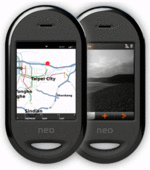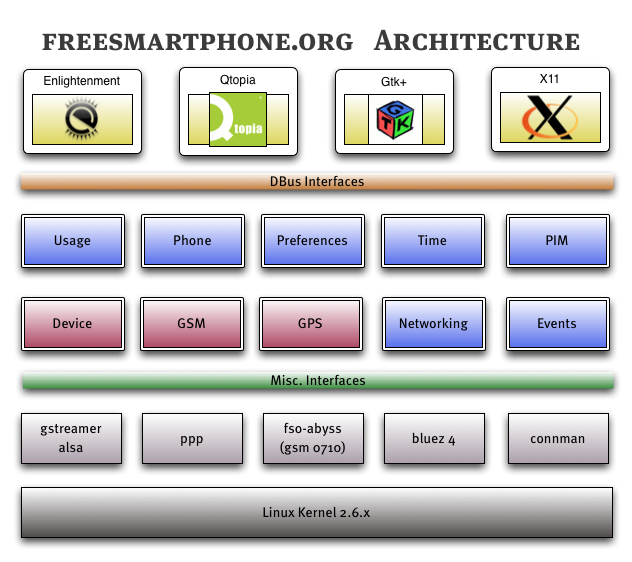User:Panta/translate
From Openmoko
m (removed article from the "root" category.) |
BrendaWang (Talk | contribs) |
||
| (7 intermediate revisions by 2 users not shown) | |||
| Line 1: | Line 1: | ||
| − | {{Languages| | + | {{Languages|Main Page}} |
| + | __NOTOC__ | ||
| + | __NOEDITSECTION__ [[Image:Freerunner02.gif|thumb|150px|right|Neo Freerunners]] | ||
| − | + | <div style="padding: 2.5ex; text-align: center; font: bold x-large sans">Openmoko™ - Open. Mobile. Free.</div> | |
| − | + | Openmoko™ è un progetto il cui scopo è distribuire telefoni cellulari con uno stack software open source. Al momento Openmoko sta vendendo il telefono [[Neo FreeRunner]] ad utenti tecnologicamente più preparati, ma inizierà a venderlo al pubblico generico nel momento in cui il software sarà sviluppato maggiormente. | |
| − | + | ||
| − | + | ||
| − | + | ||
| − | + | ||
| − | + | Lo stack Openmoko, che include un server X completo, permette ad utenti e sviluppatori di trasformare piattaforme hardware mobile in prodotti unici. La nostra licenza lascia a sviluppatori ed utenti la libertà di personalizzare i propri dispositivi a livello estetico o di modificarli radicalmente; sostituire la carta da parati o ricostruire la casa per intero! Gli garantisce la liberta, per esempio, di trasformare il telefono in un dispositivo medico, in un registratore di cassa o di installare semplicemente il proprio software preferito. Oltre a rendere libero il software presente nei nostri apparati, ne abbiamo rilasciato i relativi file CAD sotto licenza Creative Commons. In occasione del Linux world 2008, abbiamo annunciato il rilascio degli schemi interni dei nostri prodotti. | |
| − | + | ||
| − | + | ||
| − | + | ||
| − | = | + | <div style="clear:both"> </div> |
| − | + | ||
| − | + | ||
| − | + | ||
| − | + | ||
| − | + | ||
| − | = | + | <table class="wikitable" cellspacing="4" cellpadding="6" width="100%" style="color:white"> |
| − | * | + | <tr style="background:#ff6600; text-align:center; font-weight:bold"> |
| − | * | + | <td width="50%">Notizie ed eventi (en)</td> |
| − | * | + | <td width="50%">Sei nuovo ad Openmoko?</td> |
| − | * | + | </tr> |
| + | <tr valign="top" style="background:#333333"> | ||
| + | <td> | ||
| + | * 2/9: Trolltech [http://www.qtopia.net/modules/mydownloads/singlefile.php?lid=83 released] Qtopia 4.3.3-snapshot. | ||
| + | * 28/8: Trolltech [http://n2.nabble.com/qtopia-4.3.2-release-tp789148p789148.html released] Qtopia 4.3.2. | ||
| + | * 26/8: Openmoko [http://lists.openmoko.org/pipermail/community/2008-August/027997.html updates] [[Om 2008.8]] distribution. | ||
| + | * 15/8: [[Debian]] on the FreeRunner [http://n2.nabble.com/Debian-on-the-FreeRunner----now-official-td726410.html announced] (instructions for [http://wiki.debian.org/DebianOnFreeRunner FreeRunner] and [http://wiki.debian.org/DebianOnNeo1973 Neo1973]). | ||
| + | <br /> | ||
| + | * [[Weekly Engineering News|Openmoko Weekly Engineering News]] | ||
| + | * [[News Archive|(news archive)]]<!--Editors: copy removed news to News Archive! --> | ||
| + | </td> | ||
| + | <td> | ||
| + | ===<font color=white>About Openmoko</font>=== | ||
| + | * [[Introduction/it | Introduzione]] | ||
| + | * [[Why Openmoko | Why Openmoko (en)]] | ||
| + | * [[Neo FreeRunner/it|Il telefono Neo FreeRunner]] | ||
| + | * [[Supported Hardware | Supported Hardware (en)]] | ||
| + | * [[FAQ/it | FAQ]] | ||
| − | = | + | ===<font color=white>Ottenere Openmoko</font>=== |
| − | + | * [[Getting Openmoko | Getting Openmoko (en)]] | |
| − | * [ | + | * [http://www.openmoko.com Openmoko Inc.] |
| − | * [http://www. | + | |
| − | = | + | </td> |
| − | + | </tr> | |
| − | * | + | <tr style="background:#ff6600; text-align:center; font-weight:bold"> |
| + | <td width="50%">Area Utenti</td> | ||
| + | <td width="50%">Area Sviluppatori</td> | ||
| + | </tr> | ||
| + | <tr valign="top" style="background:#333333"> | ||
| + | <td> | ||
| + | ===<font color=white>Getting started</font>=== | ||
| + | * [[Getting Started with your Neo FreeRunner | Neo FreeRunner getting started guide]] | ||
| + | * [[Applications]] | ||
| − | + | ===<font color=white>Distributions</font>=== | |
| − | * | + | * [[Distributions|Features comparison table]] |
| − | * | + | * [[Om 2008.8|Om 2008.8 (ASU)]] - [[Om 2007.2|Om 2007.2 (old stable)]] |
| + | * [[OpenmokoFramework|FSO]] - [[Qtopia_on_FreeRunner|Qtopia]] - [[Debian|Debian]] - [[Gentoo|Gentoo]] | ||
| − | = | + | ===<font color=white>Openmoko community</font>=== |
| − | [[ | + | * [[Mailing List Duplicates| Mailing List Duplicates]] |
| + | * [[Discussion_Forums| Discussion Forums]] | ||
| + | * [[CommunityRepository|Community repository]] | ||
| + | * [[Development resources | Development resources]] | ||
| + | </td> | ||
| + | <td> | ||
| + | ===<font color=white>Applications development</font>=== | ||
| + | * [[Openmoko developer guide]] | ||
| + | * [[Toolchain|The toolchain]] | ||
| + | <!-- * <font color=white>VMware</font> --> | ||
| + | * [[Python|Introduction to Python]] | ||
| + | * [http://projects.openmoko.org/ Projects hosted in our GForge] | ||
| − | = | + | ===<font color=white>Integration and distributions</font>=== |
| + | * [[OpenEmbedded|The OpenEmbedded distribution building framework]] | ||
| + | * [[MokoMakefile|Building Openmoko using the MokoMakefile ]] | ||
| + | * [[Opkg|The Opkg package manager]] | ||
| − | + | ===<font color=white>Emulation</font>=== | |
| + | * [[Openmoko under QEMU]] | ||
| + | </td> | ||
| + | </tr> | ||
| + | </table> | ||
| − | + | Browse articles by [[:Category:Categories|Categories]]. | |
| − | + | ||
| − | + | ||
| − | + | ||
| − | + | ||
| − | + | ||
| − | + | ||
| − | + | ||
| − | + | ||
| − | + | ||
| − | + | ||
| − | + | ||
| − | + | ||
| − | + | ||
| − | + | ||
| − | + | ||
| − | + | ||
| − | + | ||
| − | + | ||
| − | + | ||
| − | + | ||
| − | + | ||
| − | + | ||
| − | + | ||
| − | + | ||
| − | + | ||
| − | + | ||
| − | + | ||
| − | + | ||
| − | + | ||
| − | + | ||
| − | + | ||
| − | + | ||
| − | + | ||
| − | + | ||
| − | + | ||
| − | + | ||
| − | + | ||
| − | + | ||
| − | + | ||
| − | + | ||
| − | + | ||
| − | + | ||
| − | + | ||
| − | + | ||
| − | + | ||
| − | + | ||
| − | + | ||
| − | + | ||
| − | + | ||
| − | + | ||
| − | + | ||
| − | + | ||
| − | + | ||
| − | + | ||
| − | + | ||
| − | + | ||
| − | + | ||
| − | + | ||
| − | + | ||
| − | + | ||
| − | + | ||
| − | + | ||
| − | + | ||
| − | + | ||
| − | + | ||
| − | + | ||
| − | + | ||
| − | + | ||
| − | + | ||
| − | + | ||
| − | + | ||
| − | + | ||
| − | + | ||
| − | + | ||
| − | + | ||
| − | + | ||
| − | + | ||
| − | + | ||
| − | + | ||
| − | + | ||
| − | + | ||
| − | + | ||
| − | + | ||
| − | + | ||
| − | + | ||
| − | + | ||
| − | + | ||
| − | + | ||
| − | + | ||
| − | + | ||
| − | + | ||
| − | + | ||
| − | + | ||
| − | + | ||
| − | + | ||
| − | + | ||
| − | + | ||
| − | + | ||
| − | + | ||
| − | + | ||
| − | + | ||
| − | + | ||
| − | + | ||
| − | + | ||
| − | + | ||
| − | + | ||
| − | + | ||
| − | + | ||
| − | + | ||
| − | + | ||
| − | + | ||
| − | + | ||
| − | + | ||
| − | + | ||
| − | + | ||
| − | + | ||
| − | + | ||
| − | + | ||
| − | + | ||
Latest revision as of 08:39, 18 November 2008
| Languages: |
English • العربية • Български • Česky • Dansk • Deutsch • Esperanto • Eesti • Español • فارسی • Suomi • Français • עברית • Magyar • Italiano • 한국어 • Nederlands • Norsk (bokmål) • Polski • Português • Română • Русский • Svenska • Slovenčina • Українська • 中文(中国大陆) • 中文(台灣) • Euskara • Català |
Openmoko™ è un progetto il cui scopo è distribuire telefoni cellulari con uno stack software open source. Al momento Openmoko sta vendendo il telefono Neo FreeRunner ad utenti tecnologicamente più preparati, ma inizierà a venderlo al pubblico generico nel momento in cui il software sarà sviluppato maggiormente.
Lo stack Openmoko, che include un server X completo, permette ad utenti e sviluppatori di trasformare piattaforme hardware mobile in prodotti unici. La nostra licenza lascia a sviluppatori ed utenti la libertà di personalizzare i propri dispositivi a livello estetico o di modificarli radicalmente; sostituire la carta da parati o ricostruire la casa per intero! Gli garantisce la liberta, per esempio, di trasformare il telefono in un dispositivo medico, in un registratore di cassa o di installare semplicemente il proprio software preferito. Oltre a rendere libero il software presente nei nostri apparati, ne abbiamo rilasciato i relativi file CAD sotto licenza Creative Commons. In occasione del Linux world 2008, abbiamo annunciato il rilascio degli schemi interni dei nostri prodotti.
| Notizie ed eventi (en) | Sei nuovo ad Openmoko? |
|
About OpenmokoOttenere Openmoko |
| Area Utenti | Area Sviluppatori |
Getting startedDistributionsOpenmoko community |
Applications developmentIntegration and distributions
Emulation |
Browse articles by Categories.


